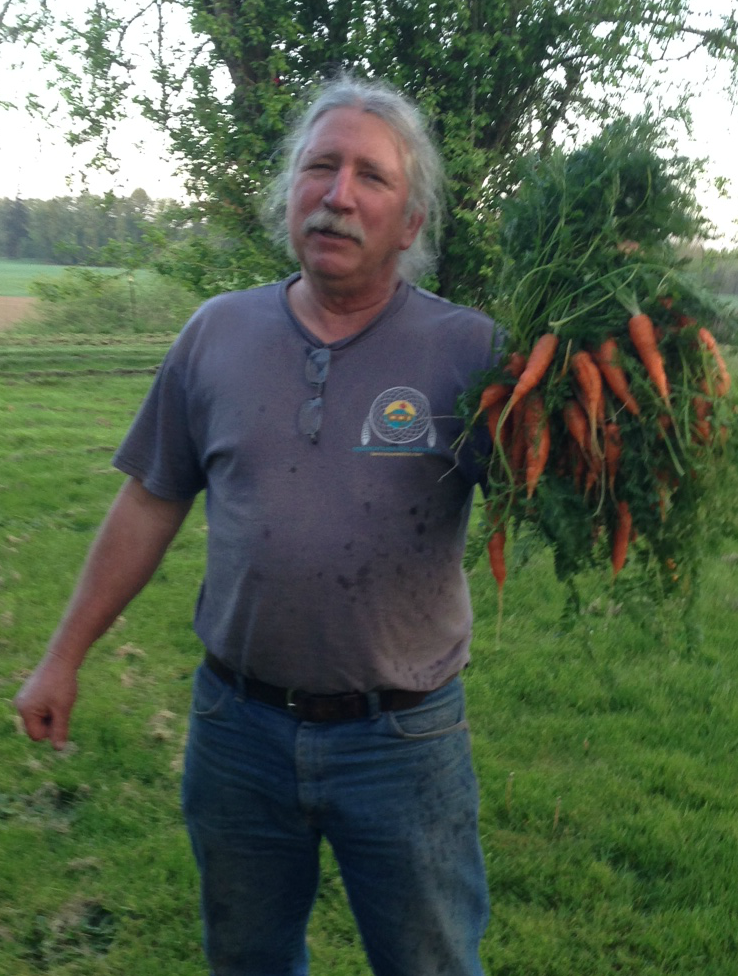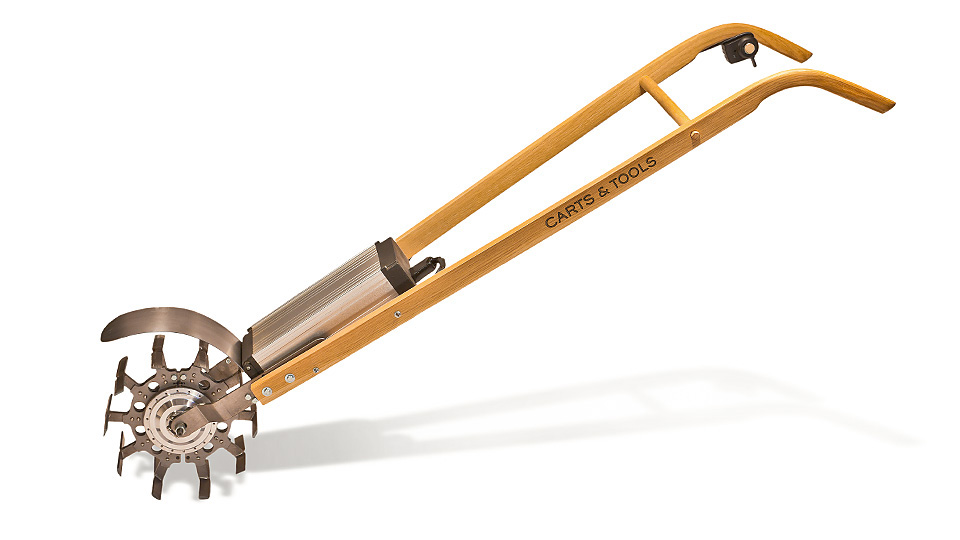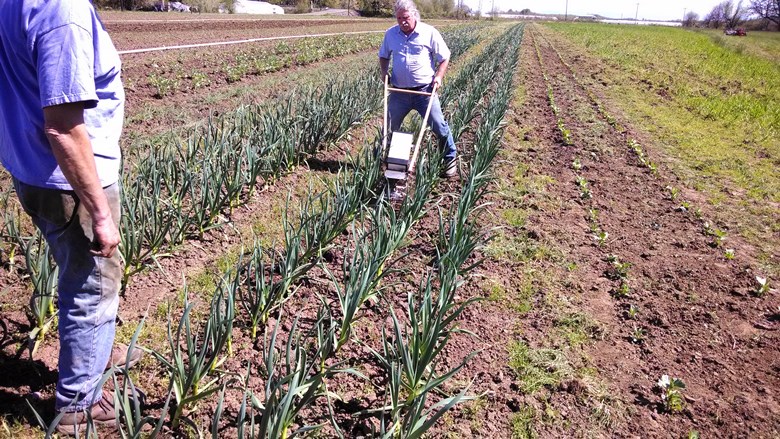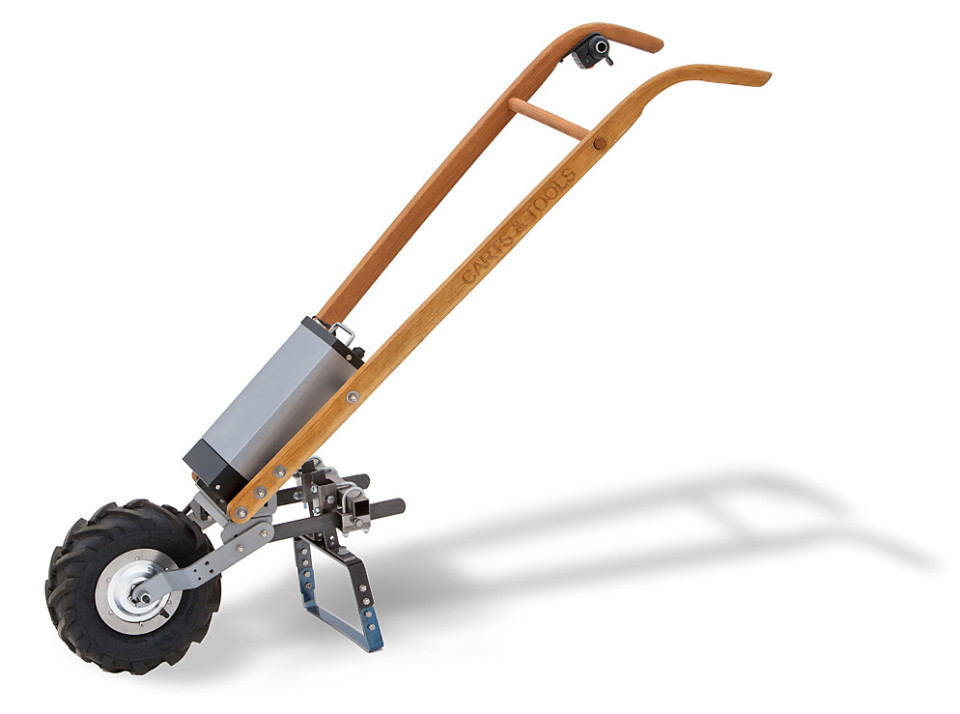 ADDRESS: 7171 NE Hwy 20, Corvallis, OR
ADDRESS: 7171 NE Hwy 20, Corvallis, OR
PHONE: 855-476-9834
WEBSITE: cartsandtools.com
OWNER: Michael McGowen
YEARS IN BUSINESS: 3
NUMBER OF EMPLOYEES: 3
WHAT THEY SELL: Battery-powered tillers and hoes for serious market growers and gardeners
WHY YOU SHOULD GO: For tools that allow you to produce more food, more efficiently
Without losing his laid-back, calm demeanor, Michael McGowen is able to convey a strong sense of excitement about small-scale farming and the tools he has developed to support it. Michael believes that small farmers have been “vastly overlooked when it comes to the availability of tools that can enable them to profitably grow fresh, local and sustainable food for all of us.” As the owner of Carts and Tools, Michael is intent on changing that scenario.
Michael, when and why did you decide to start your business? About 4 or 5 years ago, I had the idea of doing something related to what I liked—gardening—but I didn’t know what that would be. My long-range vision was to do something for harvesting grain in small batches. But that’s complicated, and I thought it would make sense to do it incrementally. So I started with carts. I spent about two years working on developing an electric cart to use around the farm and garden, something that would work on hilly terrain and could move heavy objects. (I would love to have a “smart cart” that would follow me around!) I wanted to create a product that was inexpensive and easy to use. But there were challenges related to safety. Around the time I was hitting the safety stumbling block, I was hoeing potatoes, and I noticed the motion I was using was similar to a rotary motor. I had a lot of experience with rotary motors, so I put together a prototype, and it turned out to be a nice little cultivator.

What led you to become an inventor and owner of a business in Corvallis? Originally, I was a computer engineer, working on large-scale systems design. I worked at Los Alamos, New Mexico, on super-computer networks. From there, I developed a company in Albuquerque that sold computer networking equipment. We moved enormous amounts of data. One year, every Academy Award-nominated “Best Film” had used my equipment! Also, all the early climate simulation work in the 1980s and 90s was done on my equipment. I sold that company right at the time the internet was taking off. I had worked really hard for a number of years, and I had a massive heart attack at age 46. So I semi-retired, bought a little farm, coached soccer, and raised my kids. When my wife, Jean Schumer, decided to go back to school to get her PhD in Public Health, I discovered Corvallis and really liked it. Since OSU had a Public Health program, that’s where we decided to move. I sold my property in Taos in 2008, the day the recession hit. We bought the property on Hwy. 20, and I decided I wanted to get back to my roots as an inventor. So I have this “techy” background, and I have time now to develop Carts and Tools. I try to be healthy and not too stressed.

Tell us more about your products. What are your specialties? I’m trying to develop products that assist the small farmer, not to replace the small farmer. My goal is to put efficient tools in place. The tool itself is a statement. It has a wooden handle—an attempt to use something that isn’t highly refined. It doesn’t require a lot of processing to create the handle. But there’s also a little computer that drives the motor. It uses rare earth metals and sophisticated electronics. The unfortunate thing is that they’re only made in China. The motors used in electric bikes are the same ones I use in the Tillie™ [tiller] and the Solus™ [hoe]. They’re battery-powered, so they’re quiet. You walk behind the tool—you’re not sitting on top of it. I have some people using it on farms as large as 20 acres. Mike Hessel at Red Hat Melon uses it to knock out young weeds. It’s paid for itself in just two weeks. The tool is a lot more accurate than a tractor, and the farmer is getting exercise instead of sitting on a tractor. Farmers need to be healthy, too!
Oregon and New York have a lot of market farmers, so that’s where most of my sales are. I also have customers in New Hampshire, Vermont, Minnesota, and Washington. Eventually, I still want to do small-scale grain harvesting.
Do you fill an unusual niche? What does your business do better than anyone else? My products are geared toward small-scale food production and producers. Whether it’s for the professional or amateur, our tools try to make things work more efficiently so the individual can do a lot more.

What challenges have you faced as an independent local business owner, and how have you met those challenges? Corvallis is not “start-up central”, so the investment community is limited. We were a finalist at the Willamette Angel Conference, and this coming January, we’re going to go through the Community Public Offering program offered by Hatch Oregon. That will be a better fit for what we’re about. We want to grow slowly. There’s a value in that.
What do you feel is the impact of local independent businesses on Corvallis, and what does the future look like for the local independents? One of the things that attracted us to Corvallis was the downtown. It’s a real downtown that’s vital! You could tell there’s a conscious decision to support it—by people who are trying to maintain an active downtown, going that extra mile to help the whole community. It gives a sense that “we’re all in this together.”
I think there’s a great future for local independents. There’s more and more movement in that direction. A business can do a lot more now with a lot fewer people because of technology. I can sell on the internet, Fedex can ship—I don’t have to do it—and the ability to communicate with customers is much easier. Certain aspects of manufacturing have disappeared, but some aspects have gotten easier. I can do the design, then someone somewhere else can make the product. 3-D printers allow people to make phenomenal products. There’s a lot of opportunity to localize.
What do you enjoy most about owning a local, independent business in Corvallis? What excites or inspires you? The diversity of activities! In a small business, you have to do everything. It’s like farming. The farmer has to be able to do it all. You’re always facing challenges. You don’t have to do the same thing every day.

What is your relationship to the community? What organizations do you support or participate in? I ran the Community Table at the Corvallis Farmers’ Market for four years. That was how I developed contacts within the grower community. Now I have a rapport with them. They’re my clients and test leads. I can learn from them when they have a problem. If they have feedback to give me, they know they can get my attention.
We’re part of the Corvallis Sustainability Coalition, and we’re also starting to connect with OSU. We did a tools workshop at the OSU Center for Urban Horticulture this summer.
How many people do you employ? Have you added jobs since starting the business? We have multiple contract people we work with. For a while, we had a payroll employee. But it’s a lot more efficient and cost-effective to have contractors. I’d love to be at the place where my business could support employees. But that’s a big step.
How important is sustainability to you and your business? What steps have you taken to save energy, reduce your use of resources, etc.? Sustainability is important to us—everything from packaging and shipping to using the least amount of resources. So conservation is one element of sustainability that we focus on. The other is that we’re trying to enable people in their own communities. We’re supporting our customers’ efforts to be sustainable. We’re an enabling component. If a person can have a small farm and actually do it efficiently enough to make a living, then we’ve done our job.
(Interview and article by Annette Mills – November 15, 2015)
 The Local Business of the Week program is designed to help the Corvallis community identify our locally owned independent businesses by featuring one business each week. The program is part of the Buy Local First campaign co-sponsored by the Corvallis Sustainability Coalition and the Community Independent Business Alliance (CIBA).
The Local Business of the Week program is designed to help the Corvallis community identify our locally owned independent businesses by featuring one business each week. The program is part of the Buy Local First campaign co-sponsored by the Corvallis Sustainability Coalition and the Community Independent Business Alliance (CIBA).

